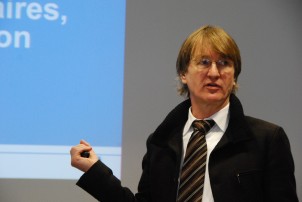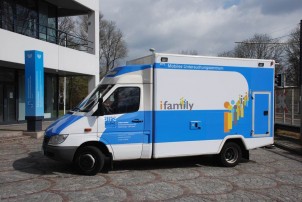Too much screen time linked to poorer well-being in childhood
Watching television, using computers and playing electronic games may have a negative impact on children’s well-being, a recent paper claims.
Based on data gathered from the European IDEFICS study (precursor to the ongoing I.Family Study), researchers have examined the association between using electronic media between ages two and six and children’s well-being two years later.
The study, published online this week in the journal JAMA Pediatrics, involved 3,604 children and used questionnaires to parents to measure six indicators of well-being, including emotional and peer problems, self-esteem, emotional security, family functioning and social networks.
Findings identified a link between the use of electronic media and poorer well-being, suggesting that the risk of emotional problems and dysfunction within families increases with each additional hour spent in front of a screen. Watching television seems to have a greater impact than playing electronic games or using computers.
Study author Trina Hinkley from Deakin University, Melbourne, explains: “Using electronic media can be a sedentary behavior, which in turn is associated with adverse health outcomes and may be detrimental at a very young age.”
The paper has already received extensive media coverage in Australia/New Zealand, Europe and the USA.
ENDS/Contacts and Notes follow
Paper published online in JAMA Pediatrics, 17th March 2014. doi:10.1001/jamapediatrics.2014.94.
Contact for Centre for Physical Activity and Nutrition Research, Deakin University, Melbourne – Trina Hinkley NHMRC Early Career Fellow. +61 3 92517723. trina.hinkley@deakin.edu.au
Contact for Ghent University (UGHENT), Belgium – Dr Stefaan De Henauw stefaan.dehenauw@ugent.be.
Media contact for I.Family Study –Kate Viggers/Rhonda Smith +44 (0) 1264 326427/+44 (0) 7887 714957. kate@minervacomms.net or rhonda@minervacomms.net
Notes for Editors:
- The I.Family Study is an EC funded project under Framework 7 of the KBBE programme running from March 2012 to February 2017. It has 17 partners, working across 11 countries and with cohorts in 8 European countries – Germany, Italy, Sweden, Hungary, Cyprus, Estonia, Spain and Belgium.
- The study has two strategic objectives:
(1) Understand the interplay between barriers against and drivers towards healthy food choice;
(2) Develop and disseminate strategies to induce changes that promote healthy dietary behaviour in European consumers especially adolescents and their parents - The I.Family Study is re-assessing the families first engaged with the Identification and Prevention of Dietary- and Lifestyle-Induced Health Effects in Children and Infants Study (IDEFICS), when children were below 10 years of age, now that they move into adolescence – the ‘tween’ years – identifying those families that have adopted a healthy approach to food and eating habits and those that have not. I. Family is adopting a holistic approach by also investigating the biological, behavioural, social and environmental factors that drive dietary behaviour as children journey towards adulthood.
4. I.Family study partners
| Participant organisation | Lead investigator(s) | Key responsibilities |
| University of Bremen, Germany | Wolfgang Ahrens | Project coordinator |
| BIPS – Institute for Epidemiology and Prevention Research GmbH, Germany | Iris Pigeot | German cohort, statistics |
| Institute of Food Sciences, National Research Council, Italy | Alfonso Siani | Italian cohort, nutritional epidemiology |
| Copenhagen Business School, Denmark | Lucia Reisch, Wencke Gwozdz |
Consumer behaviour & environmental influences |
| University of Lancaster, United Kingdom | Garrath Williams | Ethics, policy, and stakeholder engagement |
| Sahlgrenska Academy at the University of Gothenburg, Sweden | Staffan Mårild, Lauren Lissner |
Swedish cohort, family analysis |
| University of Helsinki, Finland | Jaakko Kaprio | Familial aggregation & genetic modelling |
| University of the Baleares Islands, Spain | Andreu Palou, Catalina Picó |
Genomic analysis |
| University of Pécs, Hungary | Dénes Molnár | Hungarian cohort |
| Rudolf Magnus Institute of Neuroscience, The Netherlands | Roger Adan | Neuroimaging & neuropsychology |
| Research and Education Institute of Child Health, Cyprus | Michael Tornaritis | Cypriot cohort |
| National Institute for Health Development, Estonia | Toomas Veidebaum | Estonian cohort |
| Fondazione IRCCS Istituto Nazionale Tumori, Italy | Vittorio Krogh | Dietary assessment methods |
| University of Bristol, United Kingdom | Angie Page, Ashley Cooper |
Physical activity monitoring |
| Minerva PRC Ltd, United Kingdom | Rhonda Smith Kate Viggers |
Dissemination and communication |
| University of Zaragoza, Spain | Luis Moreno | Spanish cohort |
| Ghent University, Belgium | Stefaan De Henauw | Belgian cohort |
Notes/End
140319-IF-PR8-FINAL







